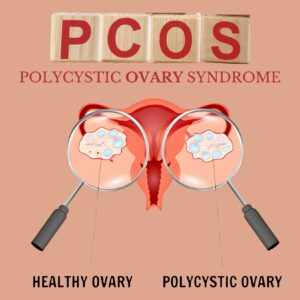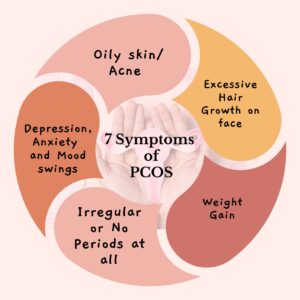Polycystic Ovary Syndrome, is a hormonal condition that affects women. 10% of women are believed to be suffering from this health issue, which affects their chances of becoming pregnant.
Importance of PCOS management among Young Girls
Young adolescent girls must be made aware of Polycystic Ovary Syndrome, its symptoms, and its impact. It is important to encourage them to follow a healthy lifestyle for PCOS management. Awareness training and being part of support groups can improve awareness and encourage girls to discuss their reproductive health and get help.

PCOS can be defined as a health condition where females have few periods, long periods, or missed periods. It is characterized by enlarged ovaries with cysts.
It affects women’s menstrual cycle, leading to missed or irregular periods. It can prevent the ovaries from releasing eggs and thus make it tough for them to become pregnant. It can also cause an increase in male hormones, and insulin resistance.
How Does PCOS Occur?
Explanation of the hormonal imbalance leading to PCOS
In PCOS, the ovaries begin to produce excess hormones. It leads to an imbalance in the reproductive system, affecting their menstrual cycles. As a result, their fertility is affected.
The role of insulin resistance and androgens
PCOS patients have excess androgen (male sex hormone). It leads to excess facial hair and hirsutism, or growth of hair on the chest, arms, and abdomen. It is believed that this occurs due to excess blood sugar levels in the body.
Genetic factors and family history
Genetics is a key factor that causes PCOS. People with family members are at increased risk of being affected. Women are at higher risk if their mothers have due to the condition being genetically acquired.
Reasons behind PCOS Management
The reason why some people get PCOS is not clearly known. It is believed that it could be due to genetics or any of the factors listed below. Obesity and a poor lifestyle will put you at a serious risk of getting PCOS. Insulin resistance is another factor that can cause Polycystic Ovary Syndrome.
- Lifestyle factors: diet, physical activity, stress
- Environmental influences: exposure to endocrine-disrupting chemicals
- Genetic predisposition and hereditary links
- The interplay between insulin resistance and hormonal imbalance
Common Symptoms of PCOS
The symptoms given below are experienced by most PCOS patients. If you experience any of these symptoms, you must see a doctor. The doctor would recommend blood tests, pelvic exams, and ultrasound scanning to diagnose PCOS. Do not ignore any of these symptoms.
- Menstrual irregularities: absent, infrequent, or heavy periods
- Excess androgen levels: hirsutism, acne, and male-pattern baldness
- Polycystic ovaries: enlarged ovaries with multiple small cysts
- Other symptoms: weight gain, difficulty in losing weight, skin darkening

Precautions to Take for PCOS Management
PCOS management program by Dr. Sheenu Sanjeev, a Dietician in Ghaziabad recommends lifestyle changes. It is the best way to manage the symptoms effectively. A healthy lifestyle with a balanced diet, regular exercise, efforts to lose weight, and reducing stress will be helpful. Getting proper sleep and avoiding exposure to chemicals that can worsen PCOS symptoms is required. It is very important to meet your doctor as per prescribed schedules and get your health checked.
- Regular health check-ups and monitoring of symptoms
- Importance of maintaining a healthy weight
- Stress management techniques: yoga, meditation, and mindfulness
- Avoiding endocrine-disrupting chemicals in daily life
Dietary Suggestions for PCOS Management
Diet is, without a doubt, a great way to manage PCOS. Since patients have problems with insulin resistance, diet is important to control blood sugar levels and also reduce androgen levels. It is important to consume a balanced diet with whole grains, vegetables, and lean proteins. Junk food that is high in sugar and processed food should be avoided. Small meals throughout the day will be helpful. It is important to choose the right diet specific to the patient’s symptoms, or else the condition could worsen.
- Importance of a balanced diet: whole grains, lean proteins, healthy fats
- Foods to include: high-fiber foods, anti-inflammatory foods, and omega-3 fatty acids
- Foods to avoid: refined sugars, processed foods, and high glycemic index foods
- Role of supplements: inositol, vitamin D, and omega-3

Exercise and Physical Activity for PCOS Management
Exercise is the best way to manage the symptoms effectively. Regular exercise and being physically active can help you lose weight, which is your main goal.
Exercise also helps you improve your overall health, strengthen the heart, and boost your immunity.
A minimum of 150 minutes of moderate exercise or 75 minutes of intensive exercise will help you get great results.
- Benefits of regular exercise: improving insulin sensitivity, reducing stress, and promoting weight loss.
- Types of exercises recommended: cardio, strength training, and flexibility exercises.
- Creating a sustainable exercise routine.
Dietary Consultant for Pcos Management
If you are suffering from PCOS and looking for a holistic solution, you must choose Healthyfy’s PCOS Management program. The program helps you manage your health through dietary changes. Healthyfy is a well-known nutritional PCOS Management consultant and has helped scores of patients improve their health through diet.
Please reach out to Healthyfy today to find out how their PCOS Management program can help you. The expert dietitians from Healthyfy will understand your condition and then provide a comprehensive diet plan suited to your health issues. Follow the diet plan Dr. Sheenu provides, and watch your health improve.
